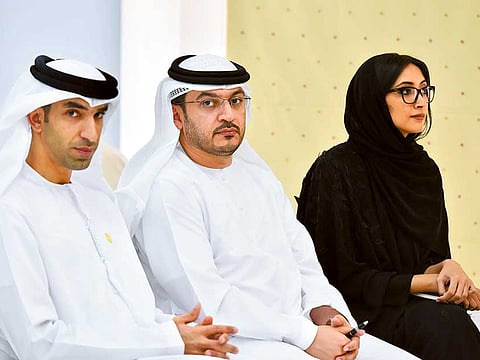UAE raises clean energy target to 27% by 2021
Country to push for access to global funds for developing countries at meeting at Marrakesh

Abu Dhabi: The UAE has decided to raise its clean energy target from 24 per cent to 27 per cent by 2021 as part of its commitment to global efforts to fight climate change, a senior official told Gulf News on Sunday.
Dr Thani Ahmad Al Zeyoudi, Minister of Climate Change and Environment, said this target is the UAE’s internal action plan to implement the Paris Climate Agreement in which 197 nations committed to reduce carbon emissions to limit global temperature rise to below 2C.
“We would like to bring international expertise [for the same],” he said on the sidelines of a media round-table on the UAE’s participation at the 22nd Conference of Parties (COP22) to the UN Framework Convention on Climate Change (UNFCCC) scheduled to be held in Marrakesh from November 7 to 18.
The UAE, which formally ratified the Paris Climate Agreement on September 21, was the first in the region to set a clean energy target of 24 per cent by 2021. Now the nation has raised that target to 27 per cent to generate energy from sources like nuclear and solar energy, which will considerably help minimise carbon emissions.
In an unprecedented show of political will, 177 countries signed the Paris agreement in April 2016, which will come into force on November 4, 2016. By October 5, the threshold for entry into force of the Paris Agreement was achieved. Eighty-three parties have so far ratified out of 197 parties to the Convention.
Al Zeyoudi said since the COP 22 at Marrakesh focuses on implementation of the Paris accord, all stakeholders would have a role in it. Therefore, the private sector, academia and youth will also represent the UAE delegation. The private sector has a major role to play in the fight against climate change, the minister said.
Along with other developing nations, the UAE will advocate technology transfer, capacity building and access to global funds [for developing nations] to implement the Paris deal.
“These are some of the many streams [in the discussions to implement the agreement]. We will work with our partners such as the GCC and G-77 (group of developing nations) and will push for access to global funds [for developing nations to fight climate change],” Al Zeyoudi said.
Fahd Mohammad Al Hammadi, director of Climate Change Department at the Ministry of Climate Change and Environment, told Gulf News that the UAE’s commitment to raise the clean energy target was followed by the nation’s solid depiction of clean energy’s economic viability. In January 2015, the tender for the second phase of Mohammad Bin Rashid Solar Park in Dubai was awarded to the lowest bidder for under 6 cents per kilowatt-hour for a 25-year fixed contract. This is the lowest solar price ever achieved worldwide, he pointed out.
Shaima Al Aydarous, senior climate analyst at the ministry, said the COP 22 at Marrakesh would give an opportunity to the private sector, academia and youth to voice their concerns, suggestions and opinions to implement the Paris deal.
The UAE in June began developing the UAE National Climate Change Plan, which will set a national framework for climate action. The Climate Change Plan is being designed in consultation with the government, business stakeholders, academia and civil society organisations and will prove that climate action can go hand in hand with increased economic growth and development.
The UAE has come up with policies and initiatives that aim to diversify the economy into new, knowledge-based industries.
The UAE has led the region in deploying clean energy, with pioneering projects and policies in renewable and nuclear energy, energy and water efficiency, and carbon sequestration.



